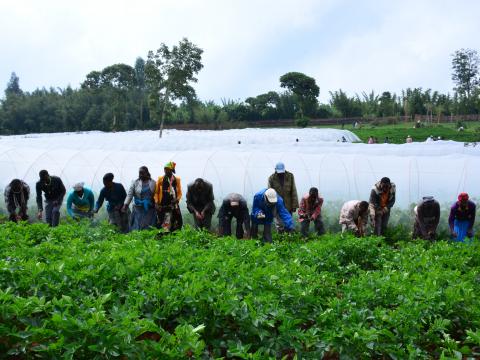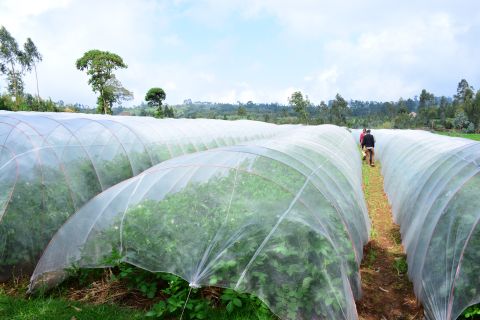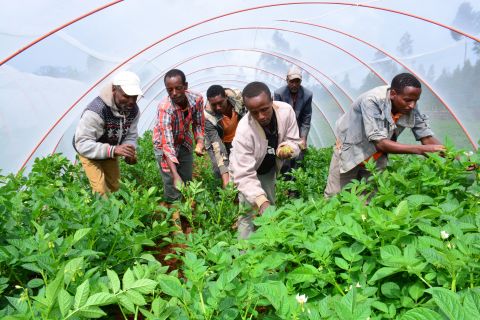Highly yielding, Virus Free Net House Potato Seed brings Glimmer of Hope to Hulla Community

In Ethiopia, potato is a high potential food security crop. Potato production is possible on about 70% of the arable land (FAO, 2008; Medhin et al., 2000; Yilma, 1989). Although, the edaphic and climatic conditions are suitable for production of high quality potato in Ethiopia, the national average production yield is about 8 tons per hectare as compared to a yield potential of about 40-50 t/ha, the major contributing factor being lack of proper seed system to potato production, lack of virus free and high yielding seed potato.
In a bid to ease some of the above challenges of farmers and contribute its parts to food security, World Vision Ethiopia funded by Korea International Cooperation Agency (KOICA) and in collaboration with Holeta Agricultural Research Center has started to produce improved seed in a net house through natural way of farming on 6.5 hectares of farmland at Hulla District organizing three farmers’ associations. The project aims to increase productivity of potato seed from 12 - 20t/ha and income of target HHs from USD 4800- 8000 on average in the project areas.
World Vision has carried out a number of decisive works to reach at this point. World Vision has provided capacity building trainings to Holeta Agriculture Seed Multiplication Staff, capacitated farmers on improved potato seed production in net house, natural fertilizers production from leaves and, tiredly worked on introduction and expansion of natural farming methodology. It also organized three Associations; namely, Vita Mino, Wirama and Gasse Associations (about 500 households) from 3 kebeles.

Net House potato farm
The first pilot phase of seed production was launched in the early March 2015 over 6.5 hectares of land. It is expected to yield a harvest of about 5 MT foundation (G1) seed in late Jun, 2015.
The Hulla District Agriculture and Natural Resource Bureau is very pleased with the newly introduced improved potato seed. Minday Mitiku, Hulla District Agriculture and natural resources head says, “In spite of huge production of potato here, the seed we were employing was not virus free as a result of which the production was 8 tons per hectare as compared to 33.3 tons per hectare potato from the newly introduced potato seed.”
“Beyond helping our farmers to grow potato in net house and following its development with experienced experts from Korea, and other pertinent local government office, World Vision has built us diffused light storage where farmers can store the harvested potatoes and fully capacitated farmers on potato production, “testifies Minday.

Potato farmers’ association members taking care of the farm in the net house.
The regional government quarantine bureau has granted certificate of quality assurance to the potato associations to further replicate the seed. Durame quarantine bureau has also granted them with a license which entitles to sale the potato seeds to any interested entity.
Right now potato seed multiplication is under implementation in three of the 31 kebeles. The District Agriculture and natural resource Office has a plan to expand it to 18 kebeles as of July, 2016 and reach all the kebeles in the next 3 years.
The potato farmers’ associations are expected to collect close to 200 tons in June from 6.5 hectare of land that was planted in early March, 2016. Shengo Adisu is one of the potato association members. He says, “I have used various kinds of potato seeds before. But the seeds were easily affected by viruses and their productivity decreases in the next production year. But this one is very special. I am now expecting to collect more than 33 tons per hectare. In similar fashion, I expect that my family life will change greatly. I also hope that we will be the source of this improved seed for entire country."
The District Agriculture and Natural Resources Bureau have already arranged 90 hectares of land for the next production season (as of July, 2016). Explaining this Mr. Minday says, “The project has given us a great prospect. We have arranged about 90 hectares of land and organized 7 cooperatives for the same. We expect to harvest about 2700 tons of potato seed out of the next harvest time.”
World Vision has a plan to further scale up the multiplication of this potato seeds in the other potato potential areas in the future.